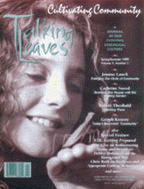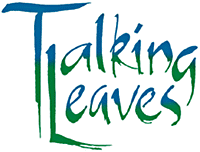

You're likely familiar with those wooden Russian dolls that nest one inside the other. Take the top off one, and you reveal yet another doll inside, again and again until uncovering the final, tiny seed doll. We can think of the smallest doll as the self: the community of one's cooperative parts: organs, skills, experiences, needs, and desires. Each part interacts with the rest according to its evolved purpose. This self-doll is nested in the larger human community, which resides in and is linked to the fate of greater Nature. Nature exists within a community of planets and stars, all of which are contained by the forms and intentions of inclusive Spirit.
The process of remaking human society will require attention to the diverse interests of our authentic inner selves. Both self and culture depend on the sustenance and example provided by the natural world, and this natural world requires our active protection. None of this is possible without the inspiration and spark of life that is the gift of the sacred.
We have only to turn to our natural surroundings, our watershed and the wild animals that inhabit it, in order to come up with examples of balance and right living. We have only to turn outward, away from our preoccupation with emotional and material baggage, to tap the energy for an inspired reformation of our community soul.
At their best, our various social constructs both reflect and respond to the needs and patterns of the watersheds where they're situated. Traditionally, terrain, weather, and available natural materials dictate the type of structures characterizing a given community--such as the peaked roofs of Alaskan log cabins, and the flat roofs and thick insulating walls of Southwestern adobe casas. For a glaring example of community indifference to the land it exists on and with/in, consider the bluegrass lawns and constantly evaporating swimming pools of desert suburbia. Little could be more obvious than the simple fact that arid regions require dry-land gardening strategies, and call for conscientious cactus and gravel landscaping.
Terrestrial and climatological influences also affect our activities, our schedules, and even our very characters. There's more at play than an easy stereotype when we speak about the "stoic" qualities of Midwestern farmers--their determination tempered by storm and crisis, their perspective shaped by flat lands and distant horizons, their patience a product of the empty miles between.
Even a modern city, filled with generic high-rises whose windows look out on nothing but other duplicate high-rises, demonstrates a palpable sense of character that's partially an effect of the rivers coursing through it, the ocean lapping at its beaches, or the mountains rising just out of sight. To some degree even the most insular and self-absorbed of societies must still feel it, and reel from it: the power of a blazing sun, the effect of long months of Northwest cloud cover, the muffled imploring of the earth beneath the pavement. Tactile rock, beating wing, and exploring, subterranean roots all touch its populace at the subconscious level. The angst and hope and inspiration that result surface in yearning arts, musical laments, and the primarily unanswered desire for us to feel at home.
On the other hand, a balanced, vibrant society consciously takes its cues from the natural world around it, responds to the needs of that world as it provides for its own. It takes on the elements of local Nature as co-members of an intentional community, as pledged allies, and as lovers...contributing to the well being of the whole, sensitive to matters that threaten its integrity or dilute its intensity of being. Such a society can be said to be ritually and fundamentally bedded in the adjoining natural world, as much as plants are bedded in the living soil. It is this essential, comprehensible grounding that affords us the wisdom of stewardship, and the grace for redemption.
The root of the word "community" is the Latin communis, meaning "common." Other words growing out of the same root include: "commune," the most deliberately sharing of contemporary social experiments; "communique," which can include interspecies messages; and "communicate," which means literally: "to make common." A healthy society is bound together by what its residents and participants share in common: shared intentions, shared needs, a body of ideas affecting the ways that we live and the quality of that life.
Certainly this is no longer the case for most American urban centers. Financial opportunity has become the primary and often sole reason for people picking a particular place to live. The second most important criterion is usually a comfortable home, followed by a "comfortable" neighborhood and available recreational opportunities. All too seldom is the reason a desire to live near relatives or to die in the habitat of our personal family history. Or to be in the company of like minded folks, engaged in that hard day-to-day work called "utopia." Or to answer a soul deep call from the lap of the redwoods, the bosom of the Rockies, the heart of the Midwestern grasslands.
I speak not as a successful communard, but as one who has slipped through the fine cracks of the social screen, proposing a harmonic social body from which I myself have opted out. Even if I stumbled upon the functioning, Earth-centered tribe I've always dreamed of, I'd likely find myself making camp at the farthest edge. Like a Seeker, or a shaman, or a leper--taking advantage of the stillness and the silence in order to apprehend the movement of power and the voices of the land!
I've been disgorged from the impersonal maw of one this country's largest metropolises. I've even found it difficult to function happily in the cooperative folds of alternative community. I understand the essential value of consensus, while finding it outside my nature. I appreciate the highest expressions of culture, but was born looking at them as if from afar. I've been too easily wounded by the back-fence gossip that helps sustain the fabric of even the most radical of alternative social experiments. In later years I prayed for, and did everything I could to orchestrate the forming of clan and tribe around the protection and celebration of this bioregion, only to find that the land spit out all but the most die-hard, and that the folks we enlisted didn't always have the best effect on the land they came to live on.
While we need natural places for our survival, as well as for our deepest fulfillment and realization, if everyone spread out from the towns and villages there wouldn't be any undeveloped places left. No room for the plants and animals, nor space for quiet, no arena for evolving wildness. No matter what my personal inclinations or failures, I know that the answer for our kind (in our times) is to cluster with like minded folks in places we love, near those places we need. And to enter into communication with the non-human world as well as with one another, using what we learn in this cycle of touching and sharing to create a society we can be glad to belong to.
Whether a small clan gathering around issues of social activism or an entire neighborhood or town, meaningful success will hinge on the cultivated ability to make common: recognizing the commonalities linking us to one another, linking our alliances and our fates to the cooperative association of the more than human realm.
Jesse Wolf Hardin is an author and presenter on matters of mindfulness and spiritual, deep ecology. This article was written especially for Talking Leaves, and will be included in his upcoming book Homeland: ReBecoming Native, Recovering Sense of Place. For information on wilderness retreats and workshops contact The Earthen Spirituality Project, PO Box 516, Reserve, NM 87830. You can find the ESP web site at www.concentric.net/~earthway.
�1999 Talking Leaves
Spring/Summer 1999
Volume 9, Number 1
Cultivating Community
We welcome your letters!
For a sample copy of the Spring/Summer 1999 issue, "Cultivating Community," send $6 to
